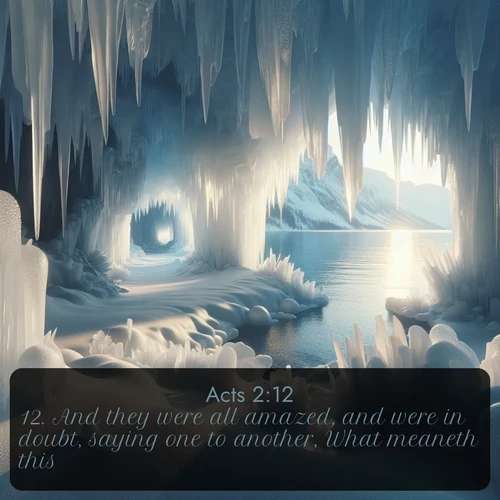Acts 2:12 plusieurs versions / traductions
English Bible Translations
12. And they were all amazed, and were in doubt, saying one to another, What meaneth this?
12. And they were all amazed, and were perplexed, saying one to another, What meaneth this?
12. And they were all surprised and in doubt saying to one another, What is the reason of this?
12. And they were all amazed and in perplexity, saying one to another, What would this mean?
12. And they were all amazed, and were in doubt, saying one to another, What meaneth this?
12. And they were all amazed, and were in doubt, saying one unto another, `What would this wish to be?'
German Bible Translations
12. Sie entsetzten sich aber alle und wurden irre und sprachen einer zu dem andern: Was will das werden?
12. Sie erstaunten aber alle und gerieten in Verlegenheit und sprachen einer zum andern: Was soll das sein?
French Bible Translations
12. Tous remplis d'étonnement et ne sachant que penser, ils se disaient les uns aux autres: «Qu'est-ce que cela veut dire?»
12. Ils étaient tous dans l’étonnement, et, ne sachant que penser, ils se disaient les uns aux autres: Que veut dire ceci?
12. Ils étaient tous dans l'étonnement, et, ne sachant que penser, ils se disaient les uns aux autres: Que veut dire ceci?
12. Et ils étaient tous hors d'eux-mêmes et en perplexité, disant l'un à l'autre: Que veut dire ceci?
12. Ils étaient donc tout étonnés, et ils ne savaient que penser, disant l'un à l'autre : que veut dire ceci?
12. Ils étaient donc tous étonnés, et ne savaient que penser, se disant l'un à l'autre: Que veut dire ceci?
Versions with Strong Codes
Acts 2 / KJV_Strong12. And[G1161] they were all[G3956] amazed,[G1839] and[G2532] were in doubt,[G1280] saying[G3004] one to another,[G243] [G4314] [G243] What[G5101] meaneth[G2309] [G302] [G1511] this?[G5124]
Strong Code definitions
G1161 de/deh a primary particle (adversative or continuative); but, and, etc.:--also, and, but, moreover, now (often unexpressed in English).
G3956 pas/pas including all the forms of declension; apparently a primary word; all, any, every, the whole:--all (manner of, means), alway(s), any (one), X daily, + ever, every (one, way), as many as, + no(-thing), X thoroughly, whatsoever, whole, whosoever.
G1839 existemi/ex-is'-tay-mee from G1537 and 2476; to put (stand) out of wits, i.e. astound, or (reflexively) become astounded, insane:--amaze, be (make) astonished, be beside self (selves), bewitch, wonder. see G1537 see G2476
G2532 kai/kahee apparently, a primary particle, having a copulative and sometimes also a cumulative force; and, also, even, so then, too, etc.; often used in connection (or composition) with other particles or small words:--and, also, both, but, even, for, if, or, so, that, then, therefore, when, yet.
G1280 diaporeo/dee-ap-or-eh'-o from G1223 and 639; to be thoroughly nonplussed:--(be in) doubt, be (much) perplexed. see G1223 see G639
G3004 lego/leg'-o a primary verb; properly, to "lay" forth, i.e. (figuratively) relate (in words (usually of systematic or set discourse; whereas G2036 and 5346 generally refer to an individual expression or speech respectively; while 4483 is properly to break silence merely, and 2980 means an extended or random harangue)); by implication, to mean:--ask, bid, boast, call, describe, give out, name, put forth, say(-ing, on), shew, speak, tell, utter. see G2036 see G5346 see G4483 see G2980
G243 allos/al'-los a primary word; "else," i.e. different (in many applications):--more, one (another), (an-, some an-)other(-s, -wise).
G4314 pros/pros a strengthened form of G4253; a preposition of direction; forward to, i.e. toward (with the genitive case, the side of, i.e. pertaining to; with the dative case, by the side of, i.e. near to; usually with the accusative case, the place, time, occasion, or respect, which is the destination of the relation, i.e. whither or for which it is predicated):-about, according to , against, among, at, because of, before, between, (where-)by, for, X at thy house, in, for intent, nigh unto, of, which pertain to, that, to (the end that), X together, to (you) -ward, unto, with(-in). In the comparative case, it denotes essentially the same applications, namely, motion towards, accession to, or nearness at. see G4253
G243 allos/al'-los a primary word; "else," i.e. different (in many applications):--more, one (another), (an-, some an-)other(-s, -wise).
G5101 tis/tis probably emphatic of G5100; an interrogative pronoun, who, which or what (in direct or indirect questions):--every man, how (much), + no(-ne, thing), what (manner, thing), where (-by, -fore, -of, -unto, - with, -withal), whether, which, who(-m, -se), why. see G5100
G2309 thelo/thel'-o theleo thel-eh'-o, and etheleo eth-el-eh'-o, which are otherwise obsolete apparently strengthened from the alternate form of G138; to determine (as an active option from subjective impulse; whereas G1014 properly denotes rather a passive acquiescence in objective considerations), i.e. choose or prefer (literally or figuratively); by implication, to wish, i.e. be inclined to (sometimes adverbially, gladly); impersonally for the future tense, to be about to; by Hebraism, to delight in:--desire, be disposed (forward), intend, list, love, mean, please, have rather, (be) will (have, -ling, - ling(-ly)). see G138 see G1014
G302 an/an a primary particle, denoting a supposition, wish, possibility or uncertainty:-- (what-, where-, wither-, who-)soever. Usually unexpressed except by the subjunctive or potential mood. Also contracted for G1437. see G1437
G1511 einai/i'-nahee present infinitive from G1510; to exist:--am, was. come, is, X lust after, X please well, there is, to be, was. see G1510
G5124 touto/too'-to neuter singular nominative or accusative case of G3778; that thing:-here (-unto), it, partly, self(-same), so, that (intent), the same, there(-fore, -unto), this, thus, where(fore). see G3778
Prédications qui analysent les thèmes Actes 2
Thèmes : Pentecôte ; Discours de Pierre ; Conversion des croyantsActes #3: Dieu tient promesse: Il donne le Saint-Esprit aux disciples de Christ. Actes chapitre 2
Related Sermons discussing Acts 2
Themes : Pentecôte ; Discours de Pierre ; Conversion des croyantsActs #3: God keeps his promise: He gives the Holy Spirit to the followers of Christ. Acts chapter 2
see also: Bible Key Verses ; KJV Bible Images, BBE Bible images

